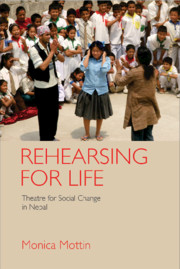Book contents
- Frontmatter
- Dedication
- Contents
- List of Tables, Figures and Boxes
- Acknowledgements
- Chapter 1 Theatre and Life: Theatre at the intersection of art, politics and international development
- Chapter 2 Spacing Out to Speak Up: Resistance, protest and the emergence of street theatre
- Chapter 3 The Streets Become the Stage: Performance, protest and theatre in a time of political crisis
- Chapter 4 Kachahari Natak: Fragments of an aesthetics of theatre for social change
- Chapter 5 Activism not Development Work: Explorations in Tharu kachahari natak
- Chapter 6 A Cultural Army for a Cultural Revolution: Maoist cultural programmes and revolutionary theatre
- Chapter 7 The Ordinariness of the Special: Towards the professionalization of theatre work
- Chapter 8 Conclusions
- Bibliography
- Index
Chapter 3 - The Streets Become the Stage: Performance, protest and theatre in a time of political crisis
Published online by Cambridge University Press: 05 April 2018
- Frontmatter
- Dedication
- Contents
- List of Tables, Figures and Boxes
- Acknowledgements
- Chapter 1 Theatre and Life: Theatre at the intersection of art, politics and international development
- Chapter 2 Spacing Out to Speak Up: Resistance, protest and the emergence of street theatre
- Chapter 3 The Streets Become the Stage: Performance, protest and theatre in a time of political crisis
- Chapter 4 Kachahari Natak: Fragments of an aesthetics of theatre for social change
- Chapter 5 Activism not Development Work: Explorations in Tharu kachahari natak
- Chapter 6 A Cultural Army for a Cultural Revolution: Maoist cultural programmes and revolutionary theatre
- Chapter 7 The Ordinariness of the Special: Towards the professionalization of theatre work
- Chapter 8 Conclusions
- Bibliography
- Index
Summary
Performance as an artistic ‘genre’ is in a constant state of crisis, and is therefore an ideal medium for articulating a time of permanent crisis such as ours.
(Guillelmo Gomez-Pena cited in Delgado and Svich, 2002, 2)Theatre all over the world seems indissolubly tied to crisis (Delgado and Svich, 2002). Sometimes it is perceived as conventional, repetitive, and marginal yet it is often thriving and dynamic in critical times (Brook, 1968; Klaic, 2002; Obeyesekere, 1999; Van Erven, 1988, 1992). Carmody asserts that
dramatic crisis has become one of the fundamental structures of our [theatre people's] imaginations, one of the intellectual and emotional technologies that allow us to perceive and act on reality’, and claims that ‘to move beyond crisis is to move outside history, to exit from the stage’ (2002, 24).
But conflict is also the essence of theatre. One of the reasons often given by my research participants for a play being bad was that ‘there is no conflict’. ‘Where there is conflict there is something to show, there is something to say’ explains Rajkumar, ‘and if there is something to say, that place is theatre’. Theatre and crisis relate in multi-faceted ways, in particular in the streets. And the streets have a distinctive connotation in Nepal. Subedi explains that ‘Nepali dramaturgy developed out of street’, as ‘[s]treet represented a space where both men and god walked together’ (2006, 45). The streets hosted festivals and dance dramas were humans personified divine characters; also, it is in the streets that ‘gods travelled in palanquins’, kings journeyed on chariots, the first cars looked like ‘alien machines’ to people, or dictators projected their power (Ibid.), as we will see.
First, theatre language is often employed metaphorically to convey paradoxical or intense moments of social life (Turner, 1974, 23). Inconsistencies in political life are often described as ‘theatre of the absurd’. Nepal's civil war – like all wars – was depicted as a ‘tragedy’. Many journalists labeled the municipal elections that King Gyanendra ordered in February 2006 a ‘farce’ because in a conflictual environment no free and fair election could take place, despite the claims of royal propaganda.
- Type
- Chapter
- Information
- Rehearsing for LifeTheatre for Social Change in Nepal, pp. 66 - 116Publisher: Cambridge University PressPrint publication year: 2017



